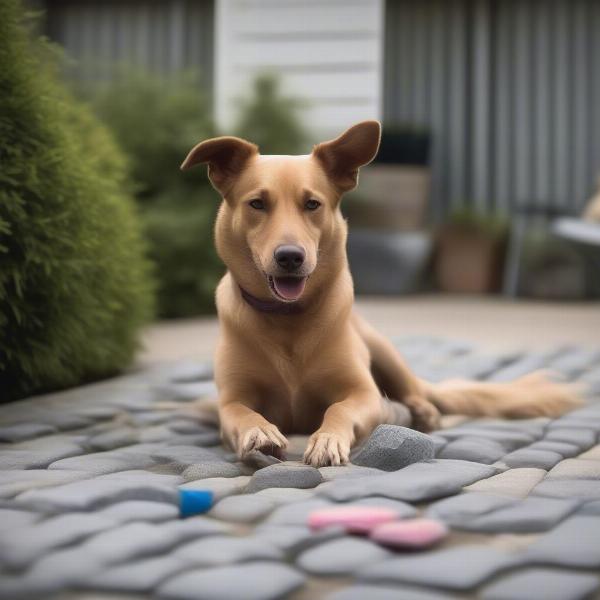If your dog has allergies to grass, you’re not alone. Grass allergies are a common issue for many dogs, causing discomfort and frustration for both pets and owners. This guide will delve into the symptoms, diagnosis, and management of grass allergies in dogs, providing you with practical advice and solutions for a happier, itch-free life for your furry friend.
Recognizing the Signs: Is it a Grass Allergy?
Grass allergies in dogs manifest in various ways, often mimicking other skin conditions. Itching is the most common symptom, with dogs frequently licking, chewing, and scratching at their paws, belly, and face. You might also notice red, inflamed skin, hair loss, and even secondary skin infections due to constant scratching. Some dogs may also experience respiratory symptoms like sneezing and coughing. If you suspect your dog has allergies to grass, consulting a veterinarian is crucial for accurate diagnosis and a tailored treatment plan.
Diagnosing Grass Allergies in Dogs
Diagnosing grass allergies involves a combination of physical examination, a review of your dog’s medical history, and potentially allergy testing. Your vet might perform intradermal skin testing or blood tests to identify specific allergens. While these tests can be helpful, they aren’t always conclusive. Sometimes, a diagnosis is made based on your dog’s symptoms and response to treatment.
Managing Your Dog’s Grass Allergies
Managing grass allergies focuses on minimizing exposure to grass and alleviating symptoms. Here are some practical strategies:
- Limit Grass Exposure: Keep your dog away from freshly cut grass. Wipe their paws and belly with a damp cloth after walks, especially during allergy season. Consider creating a designated grass-free area in your yard using paving stones or gravel.
- Bathing: Frequent baths with a hypoallergenic shampoo can help remove allergens and soothe irritated skin. Consult your vet for recommendations on appropriate shampoos.
- Medications: Your veterinarian may prescribe antihistamines, corticosteroids, or other medications to manage itching and inflammation. my dog has allergies to grass offers more in-depth information on specific treatments.
- Immunotherapy: For long-term relief, your vet might recommend allergy shots (immunotherapy). This involves gradually exposing your dog to increasing amounts of the allergen to build up their tolerance.
 Dog Playing in a Grass-Free Area
Dog Playing in a Grass-Free Area
Natural Remedies for Grass Allergies
While conventional treatments are often necessary, some natural remedies can provide additional relief for your dog’s allergies.
- Omega-3 Fatty Acids: Supplementing your dog’s diet with omega-3 fatty acids can help reduce inflammation and improve skin health. insect repellent for dogs homemade often contains ingredients with natural anti-inflammatory properties.
- Oatmeal Baths: Colloidal oatmeal baths can soothe itchy skin and provide temporary relief from allergy symptoms.
Can My Dog Live a Normal Life with Grass Allergies?
Absolutely! With proper management, dogs with grass allergies can live full and active lives. By understanding your dog’s specific needs and working closely with your veterinarian, you can effectively control their symptoms and ensure their comfort and well-being.
Conclusion
Dealing with grass allergies in dogs requires patience and a proactive approach. By recognizing the signs, seeking veterinary guidance, and implementing appropriate management strategies, you can help your dog enjoy a happy, itch-free life, even amidst grassy fields. natural dog spray for fleas might be helpful in controlling other skin irritants. Don’t hesitate to reach out to your vet if you have any concerns about your dog’s allergies.
FAQ
- How can I tell if my dog is allergic to grass? The most common signs are excessive itching, redness, and inflammation, particularly on the paws, belly, and face.
- Are there any home remedies for dog grass allergies? Oatmeal baths and omega-3 fatty acid supplements can offer some relief.
- Is there a cure for grass allergies in dogs? While there’s no cure, allergies can be effectively managed with various treatments.
- How can I prevent my dog from being exposed to grass? Wipe their paws after walks, create a grass-free area in your yard, and avoid walking them in freshly mowed areas.
- What should I do if I suspect my dog has grass allergies? Consult your veterinarian for a proper diagnosis and treatment plan.
ILM Dog is your trusted source for comprehensive information on dog care and wellbeing. We offer expert advice on everything from breed selection to health, training, nutrition, and grooming. Our website is dedicated to helping you provide the best possible care for your furry companion. For further assistance and personalized advice, contact us at [email protected] or +44 20-3965-8624. Visit ILM Dog for more valuable resources and connect with a community of passionate dog owners.